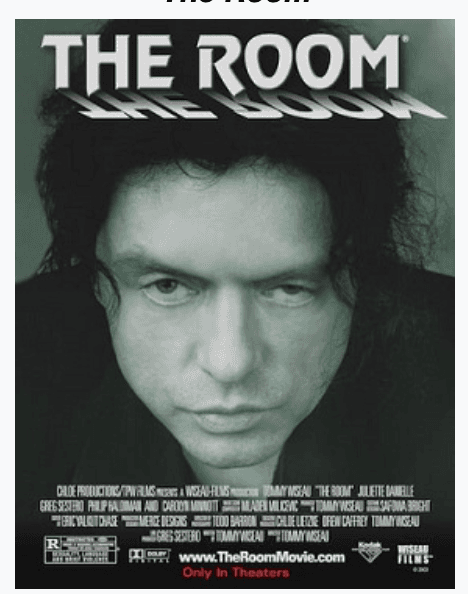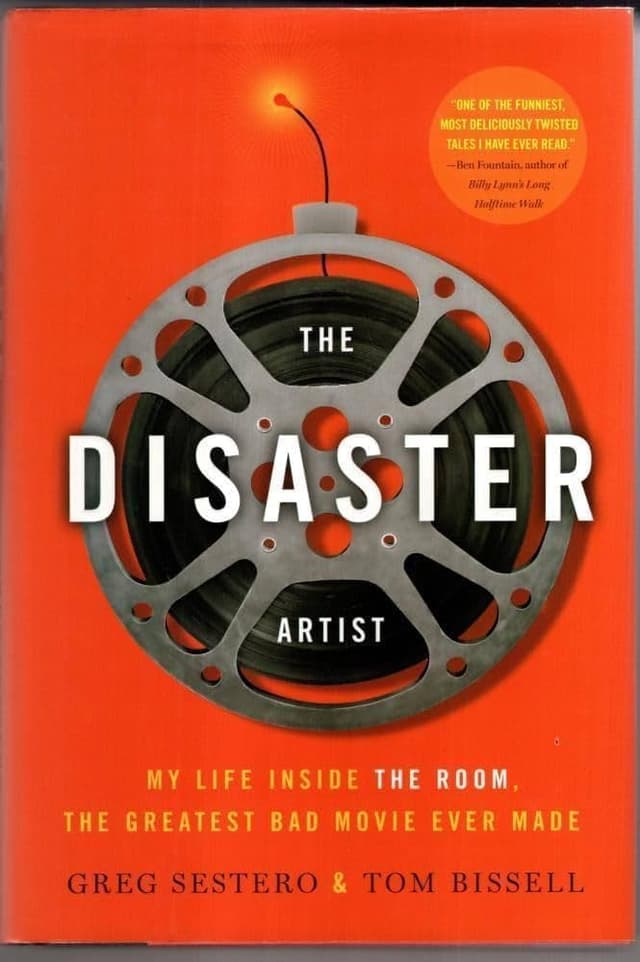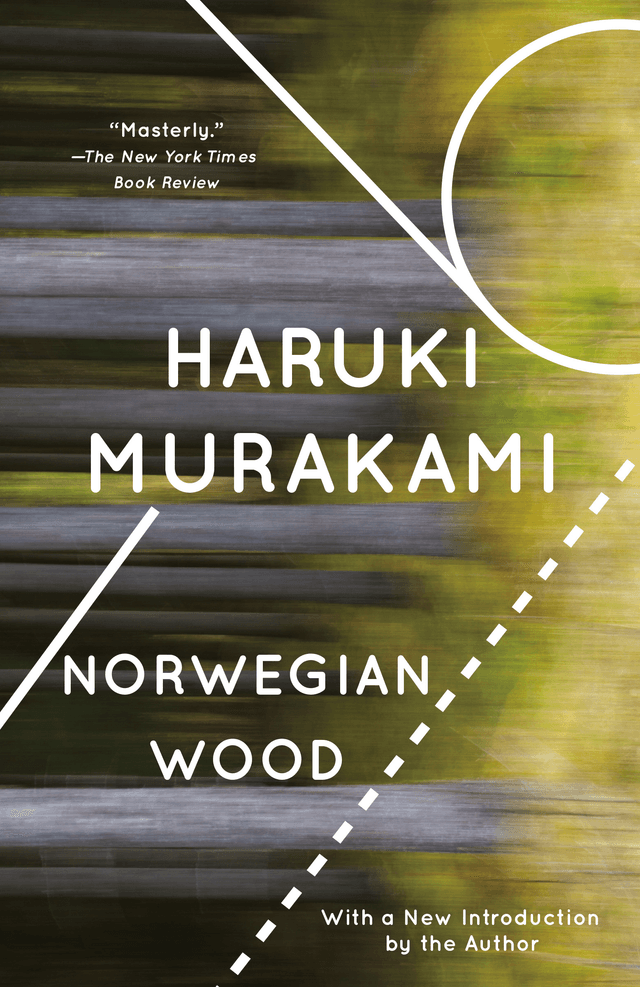The Disaster Artist vs. Norwegian Wood
The Disaster Artist
The best book about the best director in the world. It was such a great book it was adapted into a movie. Bet the other books on this list can't say that!
Norwegian Wood
Toru, a serious young college student in Tokyo, is devoted to Naoko, a beautiful and introspective young woman, but their mutual passion is marked by the tragic death of their best friend years before. As Naoko retreats further into her own world, Toru finds himself drawn to a fiercely independent and sexually liberated young woman. Stunning and elegiac, Norwegian Wood first propelled Haruki Murakami into the forefront of the literary scene.
Reviews
Reviews
| Item | Votes | Upvote |
|---|---|---|
| Entertaining | 1 | |
| Easy read | 1 | |
| Learn about Tommy Wiseau - the greatest movie director | 1 |
| Item | Votes | Upvote |
|---|---|---|
| No cons yet, would you like to add one? | ||
| Item | Votes | Upvote |
|---|---|---|
| No pros yet, would you like to add one? | ||
| Item | Votes | Upvote |
|---|---|---|
| No cons yet, would you like to add one? | ||
Frequently Asked Questions
'The Disaster Artist' is an entertaining and easy read that provides insights into the life of Tommy Wiseau, making it appealing for those interested in film and pop culture. In contrast, 'Norwegian Wood' is a more introspective and literary work that explores themes of love and loss, which may resonate more with readers looking for depth and emotional complexity. The choice between the two depends on whether you prefer a light-hearted, entertaining narrative or a profound literary experience.
'The Disaster Artist' focuses on the behind-the-scenes story of filmmaking, particularly the eccentricities of Tommy Wiseau and the making of 'The Room', which is often considered one of the worst films ever made. It highlights themes of ambition, creativity, and the absurdity of the film industry. On the other hand, 'Norwegian Wood' delves into themes of love, loss, and the complexities of human relationships, set against the backdrop of 1960s Tokyo. Readers may prefer one over the other based on their interest in either the film industry or deep emotional narratives.
'The Disaster Artist' is a book that delves into the making of the cult classic film 'The Room,' directed by Tommy Wiseau. It provides an inside look at the film's production and offers insights into Wiseau's enigmatic personality.
Pros of 'The Disaster Artist' include its entertaining narrative, easy readability, and the opportunity to learn about Tommy Wiseau, who is considered by some as one of the greatest movie directors. No cons have been listed by users at this time.
'The Disaster Artist' was adapted into a movie due to its compelling story and the cult status of 'The Room.' The book's popularity and its detailed account of the film's production made it a strong candidate for a cinematic adaptation.
'Norwegian Wood' is a novel by Haruki Murakami that follows the story of Toru, a serious college student in Tokyo. The plot revolves around Toru's devotion to Naoko, a beautiful and introspective young woman. Their relationship is deeply affected by the tragic death of their best friend years before. As Naoko withdraws further into her own world, Toru becomes attracted to another woman who is fiercely independent and sexually liberated. The novel is known for its elegiac and stunning prose, and it played a significant role in propelling Murakami into the literary spotlight.
Haruki Murakami is a renowned Japanese author known for his unique blend of fantasy, realism, and surrealism. His works often explore themes of loneliness, existentialism, and the human psyche. Some of his most famous books include 'Norwegian Wood', 'Kafka on the Shore', and '1Q84'. Murakami's writing has garnered a global audience and has been translated into numerous languages.
'Norwegian Wood' delves into themes such as love, loss, and mental health. The novel explores the complexities of human relationships and the impact of past traumas on the present. It also touches on the struggles of dealing with grief and finding one's own identity amidst emotional turmoil.
'Norwegian Wood' is significant in Haruki Murakami's career as it was the book that brought him widespread recognition and propelled him into the forefront of the literary scene. The novel's emotive and introspective narrative resonated with a large audience, establishing Murakami as a leading voice in contemporary literature.
'Norwegian Wood' contains mature themes, including mental illness, suicide, and sexual content. While it is a beautifully written novel, it may not be suitable for all readers, particularly younger audiences or those sensitive to such topics. Readers should consider these elements before deciding to read the book.
Related Content & Alternatives
- 1
 1.The Wind-Up Bird Chronicle
1.The Wind-Up Bird ChronicleIn a Tokyo suburb, a young man named Toru Okada searches for his wife’s missing cat—and then for his wife as well—in a netherworld beneath the city’s placid surface. As these searches intersect, he encounters a bizarre group of allies and antagonists. Gripping, prophetic, and suffused with comedy and menace, this is one of Haruki Murakami’s most acclaimed and beloved novels.
- 1
 3.1Q84
3.1Q84She has entered, she realizes, a parallel existence, which she calls 1Q84 —“Q is for ‘question mark.’ A world that bears a question.” Meanwhile, an aspiring writer named Tengo takes on a suspect ghostwriting project. He becomes so wrapped up with the work and its unusual author that, soon, his previously placid life begins to come unraveled. As Aomame’s and Tengo’s narratives converge over the course of this single year, we learn of the profound and tangled connections that bind them ever closer: a beautiful, dyslexic teenage girl with a unique vision; a mysterious religious cult that instigated a shoot-out with the metropolitan police; a reclusive, wealthy dowager who runs a shelter for abused women; a hideously ugly private investigator; a mild-mannered yet ruthlessly efficient bodyguard; and a peculiarly insistent television-fee collector.
- 1
 4.After the Quake
4.After the QuakeAn electronics salesman who has been deserted by his wife agrees to deliver an enigmatic package— and is rewarded with a glimpse of his true nature. A man who views himself as the son of God pursues a stranger who may be his human father. A mild-mannered collection agent receives a visit from a giant talking frog who enlists his help in saving Tokyo from destruction. The six stories in this collection come from the deep and mysterious place where the human meets the inhuman—and are further proof that Murakami is one of the most visionary writers at work today.
- 0
 5.A Wild Sheep Chase
5.A Wild Sheep ChaseA Wild Sheep Chase by Haruki Murakami is a strange, offbeat novel that blends a detective story with surreal, dreamlike elements. It follows an unnamed, easygoing narrator who gets pulled into a bizarre search for a mysterious sheep with a star-shaped mark on its back. The story kicks off when a powerful figure in Japan’s underworld pressures the narrator into finding this sheep, which seems to hold some kind of mystical influence. The book is set in late 1970s Japan, moving from urban Tokyo to the cold, isolated landscapes of Hokkaido. Along the way, the narrator is joined by his girlfriend, whose unusually perceptive ears give the story an added touch of the weird. They meet a cast of quirky characters—a shadowy secretary, a reclusive professor obsessed with sheep, and a man in a sheep costume who speaks in riddles. What stands out is how ordinary things—bars, hotels, quiet towns—become strange and otherworldly. Murakami mixes humor, loneliness, and philosophical musings, all wrapped up in a plot that meanders like a road trip with no clear destination. The novel touches on themes like identity, power, and the search for meaning, but it never hits you over the head with them. Things just kind of unfold, sometimes making sense, sometimes not—and that seems to be the point. It’s not a fast-paced thriller, nor is it a typical mystery. The journey is more about the odd encounters and the narrator’s inner reflections than solving a straightforward puzzle. If you’re into stories where reality feels slippery and the line between the ordinary and the surreal is blurred, this one might stick with you.
- 3
 1.The Room
1.The RoomThe best movie, hands down ever, by the greatest director Tommy Wiseau. A classic masterpiece produced in 2003 is still watched in theaters today. Now that is longevity!
- 1
 2.The Great Beauty
2.The Great Beautyor La grande bellezza in Italian. A masterpiece by Paolo Sorrentino in which a socialite Jep Gambardella (Toni Servillo) reflects on his life of lavish parties among the cultural elite of Rome. Stunning visual and cinematography.
- 6
 1.Antifragile: Things That Gain from Disorder
1.Antifragile: Things That Gain from Disorder"Antifragile: Things That Gain from Disorder" by Nassim Nicholas Taleb is a groundbreaking exploration of systems and entities that thrive and grow stronger in the face of stress, volatility, and chaos. Taleb introduces the concept of "antifragility," which goes beyond resilience or robustness. Through a mix of philosophy, practical wisdom, and real-world examples, Taleb illustrates how embracing uncertainty and leveraging disorder can lead to success and innovation. This book is essential for anyone interested in risk management, personal development, and understanding how to benefit from uncertainty and change.
- 4
 2.What I Talk About When I Talk About Running
2.What I Talk About When I Talk About RunningWhat I Talk About When I Talk About Running is a memoir by Haruki Murakami where he talks about two things that define a big part of his life: running and writing. Murakami didn’t always plan on being a novelist. He was running a jazz bar in his twenties when, while watching a baseball game, he suddenly thought, “I could write a novel.” He gave it a shot, it worked out, and he eventually sold his bar to focus on writing full-time. But sitting at a desk all day, smoking and not moving much, wasn’t doing his health any good. That’s when he picked up running. For Murakami, running is more than just exercise—it’s part of his routine and, in a way, a metaphor for writing. Both take endurance. Both are long hauls where you push yourself day after day, even when you don’t feel like it. The book follows him as he trains for marathons, competes in triathlons, and grapples with the slow decline of his physical abilities as he ages. He talks a lot about acceptance—accepting getting older, accepting bad race times, and accepting that sometimes you just don’t do as well as you hoped. His attitude is basically: That’s life. You move on. The writing style is straightforward, like he’s just talking to you over a coffee. He doesn’t dress things up. Sometimes he rambles, mentioning things like cycling habits or going off on tangents about global warming. At one point, he describes running the original marathon route in Greece—sun blazing, salt stinging his eyes, everything uncomfortable. But through it all, there’s this calm acceptance. He’s not trying to convince anyone to run; he just shares what it means to him. By the end, what sticks isn’t just the running or the writing, but the way he embraces both the highs and the lows—the post-race blues, the joy of finishing, and the satisfaction of something as simple as a cold beer after a long run. It’s a book about effort, routine, and learning to keep going, no matter what.
- 1
 8.Sapiens: A Brief History of Humankind by Yuval Noah Harari
8.Sapiens: A Brief History of Humankind by Yuval Noah HarariThe great thing about this book is that it takes a big-picture view of human history. It attempts to explain the main themes of human history without getting bogged down in the details. Sapiens also debunks many popular myths about human history, including the one that people today live happier lives and have better diets than our hunter-gatherer predecessors. It comes with an epilogue about the future of humankind in light of ever-accelerating technological progress. With the recent advances in AI it is more relevant than ever. If you're going to read one book on history this year, read this one.
- 0
 12.South of the Border, West of the Sun
12.South of the Border, West of the SunHajime has arrived at middle age with a loving family and an enviable career, yet he feels incomplete. When a childhood friend, now a beautiful woman, shows up with a secret from which she is unable to escape, the fault lines of doubt in Hajime’s quotidian existence begin to give way. Rich, mysterious, and quietly dazzling, in South of the Border, West of the Sun the simple arc of one man’s life becomes the exquisite literary terrain of Murakami’s remarkable genius.
- 1
 1.Project Hail Mary
1.Project Hail MaryRyland Grace is the sole survivor on a desperate, last-chance mission—and if he fails, humanity and the earth itself will perish. Except that right now, he doesn’t know that. He can’t even remember his own name, let alone the nature of his assignment or how to complete it. All he knows is that he’s been asleep for a very, very long time. And he’s just been awakened to find himself millions of miles from home, with nothing but two corpses for company. His crewmates dead, his memories fuzzily returning, Ryland realizes that an impossible task now confronts him. Hurtling through space on this tiny ship, it’s up to him to puzzle out an impossible scientific mystery—and conquer an extinction-level threat to our species. And with the clock ticking down and the nearest human being light-years away, he’s got to do it all alone. Or does he? An irresistible interstellar adventure as only Andy Weir could deliver, Project Hail Mary is a tale of discovery, speculation, and survival to rival The Martian—while taking us to places it never dreamed of going.
- 0
 2.The Martian
2.The MartianSix days ago, astronaut Mark Watney became one of the first people to walk on Mars. Now, he’s sure he’ll be the first person to die there. After a dust storm nearly kills him and forces his crew to evacuate while thinking him dead, Mark finds himself stranded and completely alone with no way to even signal Earth that he’s alive—and even if he could get word out, his supplies would be gone long before a rescue could arrive. Chances are, though, he won’t have time to starve to death. The damaged machinery, unforgiving environment, or plain-old “human error” are much more likely to kill him first. But Mark isn’t ready to give up yet. Drawing on his ingenuity, his engineering skills—and a relentless, dogged refusal to quit—he steadfastly confronts one seemingly insurmountable obstacle after the next. Will his resourcefulness be enough to overcome the impossible odds against him?
- 3
 1.Project Hail Mary by Andy Weir
1.Project Hail Mary by Andy Weir"Project Hail Mary" is a space adventure story written by Andy Weir, the same guy who wrote "The Martian." It's about a man named Ryland Grace who wakes up on a spaceship with no memory of who he is or why he's there. He figures out he's on a mission to save Earth from disaster. The story follows him as he tries to remember his past and complete his mission, which involves a lot of science and problem-solving. Along the way, he meets an alien, and they form an unlikely friendship. The book is full of cool science stuff, suspense, and humor. It's like a mix of a mystery and a space adventure, with a lot of heart. The narration by Ray Porter is superb, with sound effects and excellent voice work.
- 1
 2.Born a Crime by Trevor Noah
2.Born a Crime by Trevor NoahBorn a Crime: Stories from a South African Childhood is Trevor Noah’s autobiography, published in 2016. It tells the story of his early years growing up in South Africa during and after apartheid. The title comes from the fact that his birth—he had a black Xhosa mother and a white Swiss-German father—was literally considered a crime under apartheid laws that banned interracial relationships at the time. The book is a mix of humor and tough truths. Much of it focuses on Trevor’s relationship with his mother, Patricia, who plays a huge role in his life. She’s portrayed as tough, religious, and fiercely independent—someone who dragged him to multiple church services every week, even during times of violence and unrest. Her strong influence shapes his character, often through strict discipline and sharp lessons about right and wrong. Trevor shares stories from his childhood that range from funny to intense. There’s a scene where his mother throws him out of a moving minibus to save him from a potentially dangerous driver. He also talks about using his talent for languages to navigate different cultural groups in South Africa, and how he hustled by selling bootleg CDs to make money. But not all his stories are light—he describes living with his abusive stepfather, Abel, whose violence culminated in him shooting Trevor’s mother, though she miraculously survived. Despite the heavy topics—racism, poverty, domestic abuse—Noah’s storytelling is funny, honest, and full of warmth. The book gives a personal look at how apartheid shaped everyday life but also highlights the resilience of his family, especially his mother. The memoir was widely praised, becoming a bestseller and earning spots on numerous “best of the year” lists. It struck a chord with readers around the world, and even inspired figures like U.S. Senator Tammy Duckworth and First Lady Jill Biden, who assigned it as reading for her English class. A film adaptation is in the works, with Lupita Nyong’o set to play Trevor’s mother and co-produce the project.
- 1
 4.Mythos by Stephen Fry
4.Mythos by Stephen FryGreek myths retold by Stephen Fry. He is both the author and the narrator of this book. His wit and sense of humor come across in both the text and in the delivery. Plus, you actually get to learn Greek myths.
- 1
 5.Barbarian Days by William Finnegan
5.Barbarian Days by William FinneganBarbarian Days: A Surfing Life is William Finnegan’s story about growing up obsessed with surfing. It’s not just about catching waves—it’s about a whole way of life that’s demanding, addictive, and sometimes dangerous. Finnegan started young, learning to surf in California and Hawaii, and kept chasing waves into adulthood, traveling through places like Fiji, Australia, Indonesia, and Africa. Along the way, he mixes adventure with self-reflection, talking about friendships formed in the water, the culture around surfing, and how it all fit with the times—especially during the social changes of the 1960s and '70s. The book isn’t just about the thrill of surfing; Finnegan dives into the technical side of waves and the patience it takes to master them. He’s honest about his youthful recklessness—like taking LSD before surfing a massive wave in Maui—and the risks that came with his travels, from malaria scares to navigating shady markets. Still, surfing pulls him along, even when he’s juggling a career as a war reporter and later, family life. At its core, Barbarian Days is an old-fashioned adventure tale mixed with a thoughtful look at what it means to be hooked on something so completely. Finnegan’s writing captures both the beauty and the grind of surfing, making you feel like you’re right there with him—whether on a remote beach or paddling out into icy waves off Long Island.
- 2
 1.Confessions of an Advertising Man
1.Confessions of an Advertising ManDavid Ogilvy was considered the "father of advertising" and a creative genius by many of the biggest global brands. First published in 1963, this seminal book revolutionized the world of advertising and became a bible for the 1960s ad generation. It also became an international bestseller, translated into 14 languages. Fizzing with Ogilvy's pioneering ideas and inspirational philosophy, it covers not only advertising, but also people management, corporate ethics, and office politics, and forms an essential blueprint for good practice in business.
- 1
 2.A Gentleman in Moscow by Amor Towles
2.A Gentleman in Moscow by Amor TowlesA Gentleman in Moscow is a historical fiction novel by Amor Towles. It follows Count Alexander Rostov, a Russian aristocrat who, after the Bolshevik Revolution, is sentenced to house arrest in the grand Hotel Metropol in Moscow. Instead of being imprisoned in a cell, he’s confined to the hotel, which becomes both his cage and his world. The story spans several decades, starting in the 1920s and running through key moments of Soviet history. Most of it unfolds inside the hotel, which is no ordinary place—it's a bustling, self-contained universe. Rostov, who begins the story living in a lavish suite, is forced to move into a tiny attic room. Despite this fall from grace, he navigates his new life with wit and charm, forming friendships with the hotel staff, guests, and unexpected visitors. The book isn’t just about the Count’s personal journey—it’s also about how time changes people and places, how history creeps in even when you’re standing still, and how small acts of kindness and loyalty can shape a lifetime. The setting, the Metropol, is richly described, from fine dining rooms to back corridors. There’s a good bit about food, music, and Russian culture, and plenty of philosophical musings, but it never gets too heavy. At its core, the novel is about making the best of what life throws at you. The Count is an old-world gentleman stuck in a new world that wants to forget people like him. How he handles that—sometimes with grace, sometimes with stubbornness—is what makes the book compelling. It's quietly dramatic, occasionally funny, and surprisingly heartwarming, all without needing big action scenes.



